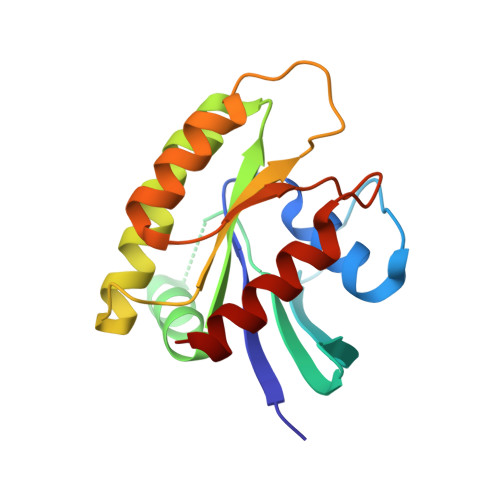Allosteric modulation of Ras positions Q61 for a direct role in catalysis.
Buhrman, G., Holzapfel, G., Fetics, S., Mattos, C.(2010) Proc Natl Acad Sci U S A 107: 4931-4936
- PubMed: 20194776
- DOI: https://doi.org/10.1073/pnas.0912226107
- Primary Citation of Related Structures:
3K8Y, 3K9N, 3LBH, 3LBI, 3LBN - PubMed Abstract:
Ras and its effector Raf are key mediators of the Ras/Raf/MEK/ERK signal transduction pathway. Mutants of residue Q61 impair the GTPase activity of Ras and are found prominently in human cancers. Yet the mechanism through which Q61 contributes to catalysis has been elusive. It is thought to position the catalytic water molecule for nucleophilic attack on the gamma-phosphate of GTP. However, we previously solved the structure of Ras from crystals with symmetry of the space group R32 in which switch II is disordered and found that the catalytic water molecule is present. Here we present a structure of wild-type Ras with calcium acetate from the crystallization mother liquor bound at a site remote from the active site and likely near the membrane. This results in a shift in helix 3/loop 7 and a network of H-bonding interactions that propagates across the molecule, culminating in the ordering of switch II and placement of Q61 in the active site in a previously unobserved conformation. This structure suggests a direct catalytic role for Q61 where it interacts with a water molecule that bridges one of the gamma-phosphate oxygen atoms to the hydroxyl group of Y32 to stabilize the transition state of the hydrolysis reaction. We propose that Raf together with the binding of Ca(2+) and a negatively charged group mimicked in our structure by the acetate molecule induces the ordering of switch I and switch II to complete the active site of Ras.
- Department of Molecular and Structural Biochemistry, North Carolina State University, 128 Polk Hall-CB 7622, Raleigh, NC 27695, USA.
Organizational Affiliation:



















